Mary Mary quite contrary – pattern play
Nursery Rhymes are such a key part of childhood and some of our favourites are ones that I learnt as a child as well as some that we have learnt at library sessions with both the children as babies. This week’s #playfulpreschool theme is all about Nursery Rhymes, and we’re sharing activities and crafts that will help you to incorporate these fantastic childhood favourites into your home or classroom with your preschoolers. I’ve written about Nursery Rhymes before sharing our 10 favourite Rhymes for Tots, Rhymes to get tots moving and Rhymes for counting.

As a child, I had a beautifully illustrated nursery rhyme book that was brought as a birth present. My parents read it throughout my childhood and it still sits in my parents’ house very worn and much loved. Of the rhymes in the book my favourite was Mary Mary Quite Contrary, and I remember the page showing her tending to her beautiful garden with cockle shells at the front, followed by silver bells and then a row of pretty maids behind.
Mary Mary quite contrary, how does your garden grow?
With silver bells, and cockle shells and pretty maids all in a row.
Taking the idea of rows and the objects from the nursery rhyme, these week we’re working on patterns – another key area of preschool maths. Last week with the snowmen pegs we were looking at 1 to 1 correspondence and counting but to move forward children need to follow patterns – at the moment picture patterns, but later these develop into sequences like times tables, spotting the pattern with the difference between numbers and replicating it.
Materials needed
Silver Mirror Card
Brown/oatmeal coloured card
Pencil
Scissors
Preparation
Onto the back of the mirror card draw a simple bell shape and then cut this out.
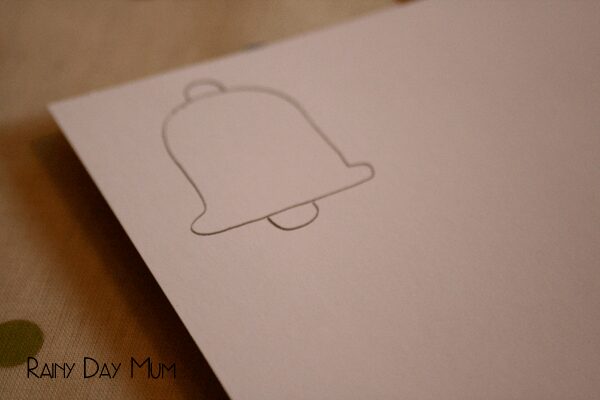
Use this as a template to draw around and produce 10 silver bells.
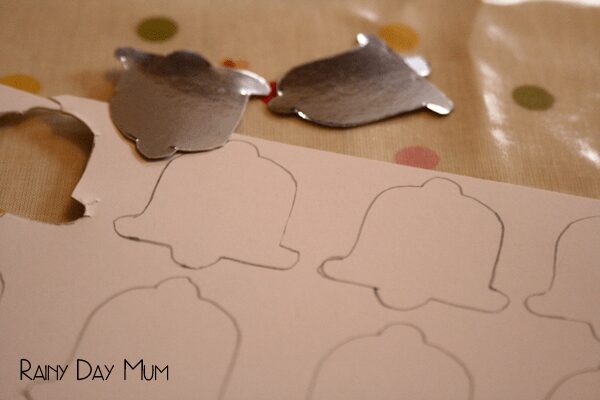
Cut out the bells.
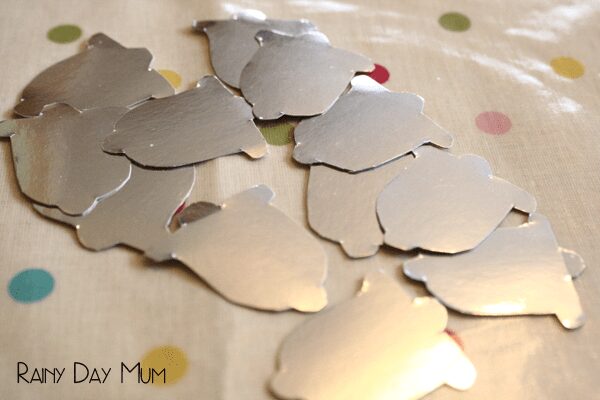
On the oatmeal coloured card draw a cockle shell shape and cut out. I added lines like a cockle shell to the cut out shell. Use this as a template and again cut out 10 cockle shells.

Learning objectives
- Recognise a pattern
- Continue on a picture pattern
Mary Mary quite contrary pattern play
On a table start out with a simple pattern, silver bell, cockle shell in a row set out 3 or 4 of the sequence.
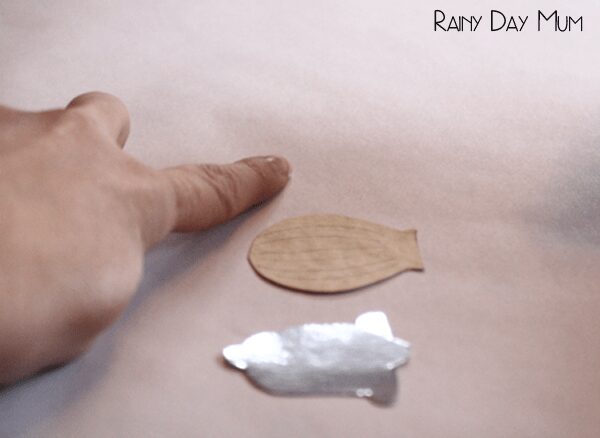
With your child, look at the objects, and get them to say them whilst pointing to them.

Continue on the sequence – ask “What comes next? Make sure you have the two piles of spare cockle shells and silver bells available and ask them to move what is next into place.

When they are confident with an alternate sequence pattern, move on to more complex patterns, 2 silver bells 1 cockle shell, 3 bells 2 cockle shells etc.
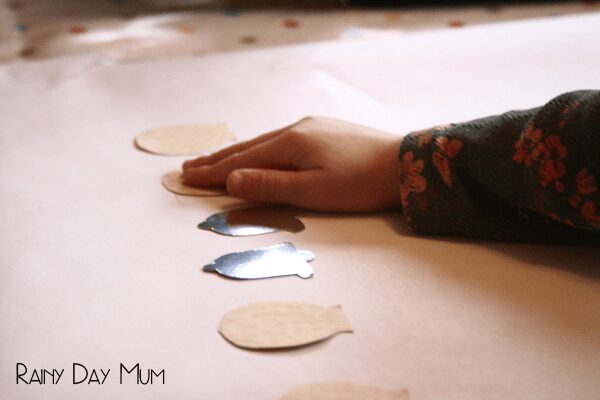
Set out the simple sequence again, and this time complete it leaving 2 of the bells and 2 cockle shells off. Then remove 2 items from the pattern and ask your child to fill in the gap.
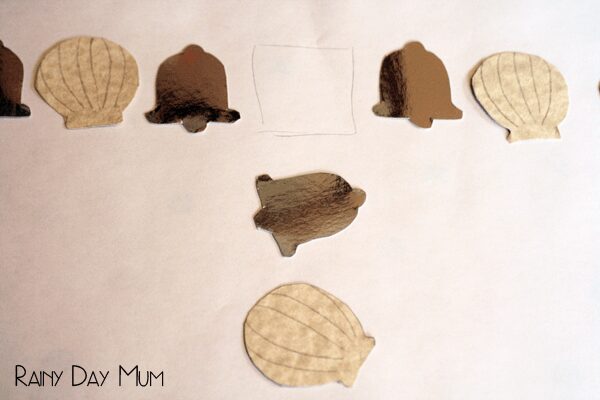
Repeat this with the longer sequence.
Extending and using with older children
To extend this you could add in other objects e.g. some flowers, watering cans or even buttons and make 3 or more item patterns, always start off with the simple sequence and then add in combinations of the sequence.
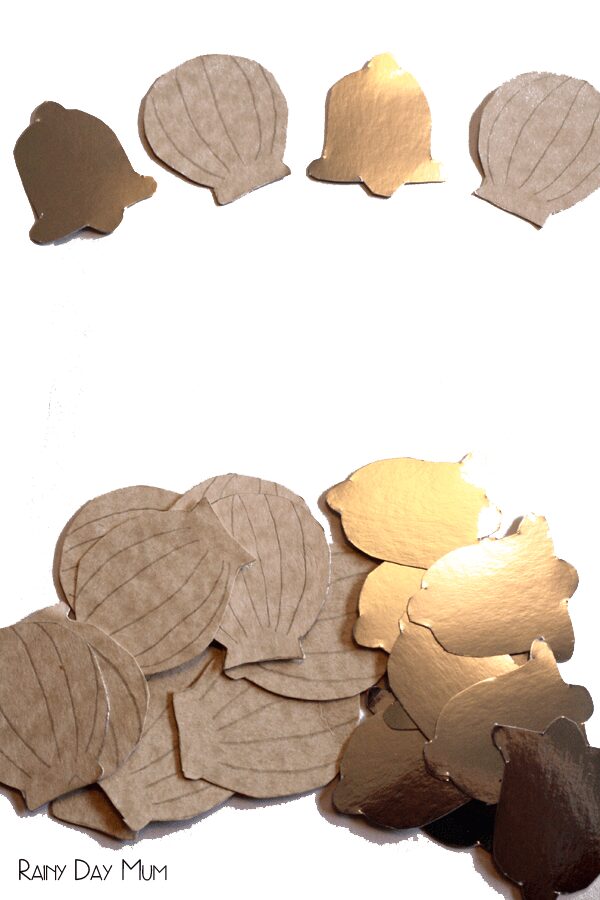
For much older children you could have the pattern repeat after 4 arrangements instead of 2 e.g. 1 cockle shell, 1 silver bell, 2 cockle shells, 1 silver bell and repeat or work on continuing a sequence e.g. 1 cockle shell, 1 silver bell, 2 cockle shells, 2 silver bells, 3 cockle shells….
More Nursery Rhyme Themed Activities for Kids
Check out these other fabulous nursery rhyme themed activities for kids from our archives.
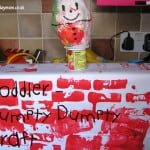


The Playful Preschool Team has even MORE Nursery Rhyme Activities for Children.
Cerys Parker
Cerys is a marine biologist, environmental educator, teacher, mum, and home educator from the UK. She loves getting creative, whether it is with simple and easy crafts and ideas, activities to make learning fun, or delicious recipes that you and your kids can cook together you'll find them all shared here on Rainy Day Mum.


We are working on patterning now. Thanks so much for the idea!
What a lovely patterning idea for the nursery rhyme – especially since it seems your childhood book helps inspire you! 🙂
Super cute math activities. This is one of my favorite nursery rhymes!
I love this patterning activity! It is great for building math skills and helps to bring the nursery rhyme to life.
Excellent patterning activity! It goes perfectly with the nursery rhyme. I also like that you included extension activities.